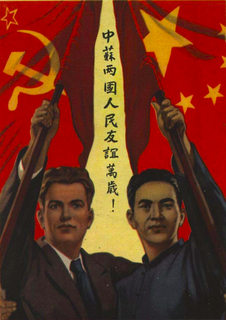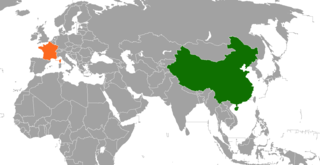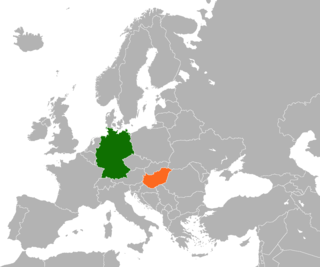
The foreign relations of the Italian Republic are the Italian government's external relations with the outside world. Located in Europe, Italy has been considered a major Western power since its unification in 1861. Its main allies are the NATO countries and the EU states, two entities of which Italy is a founding member. Italy is an important actor in the Mediterranean region and has close relations with the Romance-speaking countries in Europe and Latin America. Although it is a secular state, Rome hosts the Pope and the headquarters of the Catholic Church, which operates a large diplomatic system of its own. Italy is currently commanding various multinational forces and has significant troops deployed all over the world for peacekeeping missions, and for combating organized crime, illegal drug trade, human trafficking, piracy and terrorism.

The Sino-Soviet split was the breaking of political relations between the People's Republic of China and the Soviet Union caused by doctrinal divergences that arose from their different interpretations and practical applications of Marxism–Leninism, as influenced by their respective geopolitics during the Cold War of 1945–1991. In the late 1950s and early 1960s, Sino-Soviet debates about the interpretation of orthodox Marxism became specific disputes about the Soviet Union's policies of national de-Stalinization and international peaceful coexistence with the Western Bloc, which Chinese founding father Mao Zedong decried as Marxist revisionism. Against that ideological background, China took a belligerent stance towards the Western world, and publicly rejected the Soviet Union's policy of peaceful coexistence between the Western Bloc and Eastern Bloc. In addition, Beijing resented the Soviet Union's growing ties with India due to factors such as the Sino-Indian border dispute, and Moscow feared that Mao was too nonchalant about the horrors of nuclear warfare.

The Boxer Protocol was signed on September 7, 1901, between the Qing Empire of China and the Eight-Nation Alliance that had provided military forces, after China's defeat in the intervention to put down the Boxer Rebellion. It is often regarded as one of the Unequal Treaties.

The Eight-Nation Alliance was a multinational military coalition that invaded northern China in 1900 with the stated aim of relieving the foreign legations in Beijing, then besieged by the popular Boxer militia, who were determined to expunge foreign influence from China. The Allied forces consisted of about 45,000 troops from the eight nations of Germany, Japan, Russia, Britain, France, the United States, Italy, and Austria-Hungary. Neither the Chinese nor the foreign allies issued a formal declaration of war. No treaty or formal agreement bound the Alliance together. Some western historians define the first phase of hostilities, starting in August 1900, as "more or less a civil war", though the Battle of the Taku Forts in June pushed the Qing government to support the Boxers. With the success of the invasion, the later stages developed into a punitive expedition, which pillaged Beijing and North China for more than a year. The fighting ended in 1901 with the signing of the Boxer Protocol.

Chinese-United Kingdom relations, more commonly known as British–Chinese relations, Anglo-Chinese relations and Sino-British relations, refers to the interstate relations between China and the United Kingdom.

The Sino-Soviet Treaty of Friendship, Alliance and Mutual Assistance, or Sino-Soviet Treaty of Friendship and Alliance for short,was a bilateral treaty of alliance, collective security, aid and cooperation concluded between the People’s Republic of China and the Union of Soviet Socialist Republics on February 14, 1950. It superseded the previous Sino-Soviet treaty signed by the Kuomintang government.

Sino–German relations were formally established in 1861, when Prussia and the Qing dynasty concluded a Sino-German treaty during the Eulenburg expedition. A decade later, the German Empire was established, with the new state inheriting the Prussian-era treaties concluded with China. Sino-German relations during the late 19th and early 20th century were frequently tense, as Germany followed the example of other European colonial powers in carving out a sphere of influence in China; by 1914, Germany had obtained several concessions in China, including the treaty ports of Yantai and Qingdao and most prominently the Jiaozhou Bay Leased Territory.

The foreign concessions in Tianjin were concession territories ceded by Qing China to a number of European countries, the United States and Japan within the city of Tianjin. There were altogether nine foreign concessions in old Tianjin on the eve of World War II. These concessions also contributed to the rapid development of Tianjin from the early to mid-20th century. The first foreign concessions in Tianjin were granted in 1860. By 1943, all the foreign concessions, except the Japanese concession, had ceased to exist de facto.

China–France relations, also known as Sino-French relations or Franco-Chinese relations, refers to the interstate relations between China and France.
The Li–Lobanov Treaty or the Sino-Russian Secret Treaty was a secret and unequal treaty signed on June 3, 1896 in Moscow by foreign minister Alexey Lobanov-Rostovsky on behalf of the Russian Empire and viceroy Li Hongzhang on behalf of Qing China. The treaty and its consequences increased anti-foreign sentiment in China, which came to a head in the Boxer Uprising of 1900.

From the 17th century through to the 19th century, the Habsburg Monarchy, Austrian Empire, and the Austro-Hungarian Empire made a few small short-lived attempts to expand overseas colonial trade through the acquisition of factories. In 1519–1556 Austria's ruler also separately ruled Spain, which did have a large colonial empire. However no other Austrians were involved when Emperor Charles V held the crown of both the Spanish Empire and the Holy Roman Empire and the Spanish colonies were not linked to Austria.

Bilateral relations between China and Italy date back to Imperial China and Ancient Rome but the ties between Italy and modern China only formally began on 27 November 1928 and recognized the People's Republic on 6 November 1970. News of Italy's recognition of the People's Republic of China and consequent breaking of formal relations with the Republic of China (Taiwan) spurred other European countries such as Austria and Belgium to consider similar moves.

The U.S. Embassy in Austria is located in Vienna. Since 2018, the United States Ambassador to Austria is Trevor D. Traina. The Austrian Embassy in the U.S. is located in Washington, D.C. Since 2019, the Austrian Ambassador to the United States is Martin Weiss.

Hungary–Russia relations refer to bilateral foreign relations between the two countries, Hungary and Russia. During the Second World War, the Soviet army took over Hungary, and in 1948 Moscow took full control of the country. It became part of the Warsaw Pact, designed as a military alliance against NATO. The relations between both countries were damaged in 1956 due to the Soviet military intervention in the revolution occurring in Hungary. Hungary expelled its communist government in 1989, and diplomatic relations with Russia were restored after the breakup of the USSR in 1991.

The establishment of diplomatic relations between Albania and the Soviet Union happened on April 7, 1924. Both countries were also allies in the Warsaw Pact. Albania has an embassy in Moscow. Russia has an embassy in Tirana.

The century of humiliation, also known as the hundred years of national humiliation, is the term used in China to describe the period of intervention and subjugation of the Qing dynasty and the Republic of China by Western powers and Japan from 1839 to 1949.

Germany–Hungary relations are the relations between Germany and Hungary, two member states of the European Union and the NATO. Both countries have a long shared history. Germany has an embassy in Budapest. Hungary has an embassy in Berlin, two general consulates and nine honorary consulates. The Agreement between the Federal Republic of Germany and the Republic of Hungary on 'Friendly Cooperation and Partnership in Europe' concluded on 6 February 1992 is one of the principal cornerstones of today's bilateral relations.

The Italian concession of Tianjin was a small territory (concession) in central Tianjin, China, controlled by the Kingdom of Italy between 1901 and 1943, officially ceded to China in 1947.

This article covers worldwide diplomacy and, more generally, the international relations of the great powers from 1814 to 1919. The international relations of minor countries are covered in their own history articles. This era covers the period from the end of the Napoleonic Wars and the Congress of Vienna (1814–15), to the end of the First World War and the Paris Peace Conference.

The Austro-Hungarian concession of Tianjin was a territory (concession) in the Chinese city of Tientsin occupied colonially by Austria-Hungary between 1902 and 1920. It had been obtained by Austria-Hungary after the signing of the Boxer Protocol at the conclusion of the conflict between China and the Alliance of Eight Nations, which had sent an international expeditionary force to quell the Boxer Rebellion of 1901. Although the Austro-Hungarian occupation corps had been present from the previous year, the concession formally began on December 27, 1902. It is the shortest lived concession, having existed for only 14 years.





















